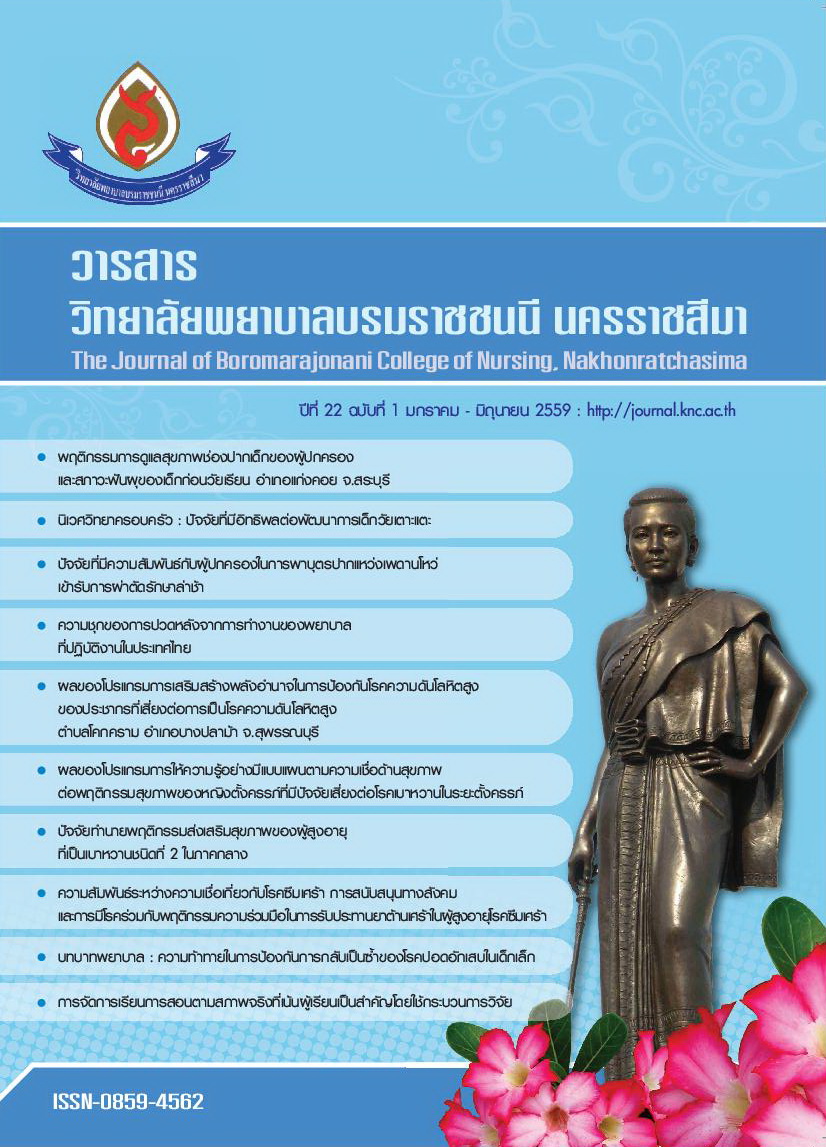นิเวศวิทยาครอบครัว: ปัจจัยที่มีอิทธิพลต่อพัฒนาการเด็กวัยเตาะแตะ
คำสำคัญ:
พัฒนาการเด็ก, นิเวศวิทยาครอบครัว, การวิเคราะห์เส้นทางบทคัดย่อ
วัยเด็กตอนต้นเป็นโอกาสทองของการส่งเสริมพัฒนาการ แต่เด็กวัยนี้ส่วนใหญ่ยังไม่ได้รับการพัฒนาเต็มตามศักยภาพ การศึกษาความสัมพันธ์ที่ซับซ้อนของปัจจัยที่มีอิทธิพลต่อพัฒนาการเด็กในวัยนี้จึงเป็นเรื่องสำคัญ การวิจัยในครั้งนี้มีวัตถุประสงค์เพื่อศึกษาปัจจัยที่มีอิทธิพลต่อพัฒนาการเด็กวัยเตาะแตะ ได้แก่ การดื่มสุราของบิดา การศึกษาของมารดา รายได้ครอบครัว การมีส่วนร่วมของบิดา ความรู้เกี่ยวกับพัฒนาการเด็ก การสนับสนุนทางสังคม ความเครียดของการเป็นมารดา สิ่งแวดล้อมของบ้าน ความมั่นคงทางด้านอาหารและพัฒนาการเด็ก โดยใช้กรอบแนวคิดนิเวศวิทยาของพัฒนาการมนุษย์ (Bronfenbrenner, 2005) และจากการทบทวนวรรณกรรม กลุ่มตัวอย่าง ได้แก่ บิดา มารดาและเด็ก ช่วงอายุ 18-36 เดือนได้มาจากการสุ่มหลายขั้นตอนจำนวน 12 ตำบลในจังหวัดสระบุรี เครื่องมือที่ใช้ในการเก็บรวบรวมข้อมูลเป็นแบบสอบถามข้อมูลส่วนบุคคลของบิดามารดาและครอบครัว การมีส่วนร่วมของบิดา ความรู้เกี่ยวกับพัฒนาการเด็ก แบบคัดกรองการดื่มสุรา การสนับสนุนทางสังคม ความเครียดในการเป็นมารดา ความมั่นคงด้านอาหารการสังเกตสิ่งแวดล้อมของบ้าน และการประเมินพัฒนาการของ Bayley Scale of Infant and Toddler Development วิเคราะห์ข้อมูลโดยใช้สถิติเชิงพรรณนาและใช้โปรแกรม AMOS สำหรับการวิเคราะห์เส้นทางผลการวิจัย พบว่า โมเดลเส้นทางปัจจัยที่ส่งผลต่อพัฒนาการเด็กมีความสอดคล้องกับข้อมูลเชิงประจักษ์ (χ2 / d=2.729, GFI = 0.96, NFI = 0.97, CFI = 0.97, RMSEA.079) โดยพัฒนาการเด็ก ได้รับอิทธิพลสูงสุดโดยตรงจากปัจจัยสิ่งแวดล้อมของบ้าน (0.34) และเส้นทางอิทธิพลทางอ้อมจากเส้นทางการมีส่วนร่วมของบิดา (0.74) โดยส่งผ่านสิ่งแวดล้อมของบ้าน ตัวแปรทั้งหมดอธิบายความแปรปรวนของพัฒนา การเด็กได้ร้อยละ 12% ผลจากการศึกษาครั้งนี้เป็นข้อมูลเพื่อใช้เป็นแนวทางในการจัดโปรแกรมเพื่อเพิ่มพัฒนาการเด็กต่อไป
Ecology of the Family: Factors Influencing Child Development in Toddler
Abstract
Early childhood development period is a “golden opportunity” for optimally developing a child's
life. However, most children do not fulfill their developmental potential. Therefore, a study of the complex relationships between these factors and their combined impact on child development is needed. This study aimed to examine the predictive power of the correlations between paternal alcohol use, maternal education, family income, paternal involvement, maternal knowledge about childhood development, social support, maternal stress, home environment, food security and child development. The conceptual framework used to guide this study was derived from the bio-ecological perspective with Bronfenbrenner aspects of human development and literature review. A sample of 230 parent-child pairs with toddlers aged 18-36 months were recruited from 12 sub-districts in Saraburi Province. The instruments used for data collection were composed of a demographic questionnaire, a paternal involvement scale, a caregiver knowledge of childhood development inventory, the Alcohol Use Disorders Identification Test (AUDIT) with a revised multidimensional scale of perceived social support, a parenting stress index short form, the Thai-translated HOME, the Thai Household Food Security Scale and the Bayley Scale of Infant and Toddler Development. The data was analyzed by descriptive statistics and Analysis of Moment Structure (AMOS) for path analysis.
The findings indicated that the model fit with the empirical data at χ2/d = 2.729, GFI = .96, NFI = .97, CFI = .97, RMSEA.079. The analysis demonstrated that paternal involvement and home environment had a strong and positive effect on childhood development (β =.34 p < .001). Paternal alcohol use, paternal involvement, maternal knowledge of childhood development and parenting stress had a indirect effect on child development mediated by the home environment. The variables in the model accounted for 12% of the variance in the child development. The results provide information and can guide the development of an intervention program for better outcomes in childhood development.
ดาวน์โหลด
ฉบับ
ประเภทบทความ
สัญญาอนุญาต
บทความที่ได้รับการตีพิมพ์เป็นลิขสิทธิ์ของ วารสารสุขภาพและการศึกษาพยาบาล ซึ่งดำเนินการโดยวิทยาลัยพยาบาลบรมราชชนนี นครราชสีมา
ข้อความที่ปรากฏในบทความในวารสารเล่มนี้เป็นความคิดเห็นส่วนตัวของผู้เขียนแต่ละท่านไม่เกี่ยวข้องกับกองบรรณาธิการวารสารสุขภาพและการศึกษาพยาบาล หรือวิทยาลัยพยาบาลบรมราชชนนี นครราชสีมา แต่อย่างใด ความรับผิดชอบองค์ประกอบทั้งหมดของบทความแต่ละเรื่องเป็นของผู้เขียนแต่ละท่าน หากมีความผิดพลาดใดๆ ผู้เขียนแต่ละท่านจะรับผิดชอบบทความของตนเองแต่ผู้เดียว







